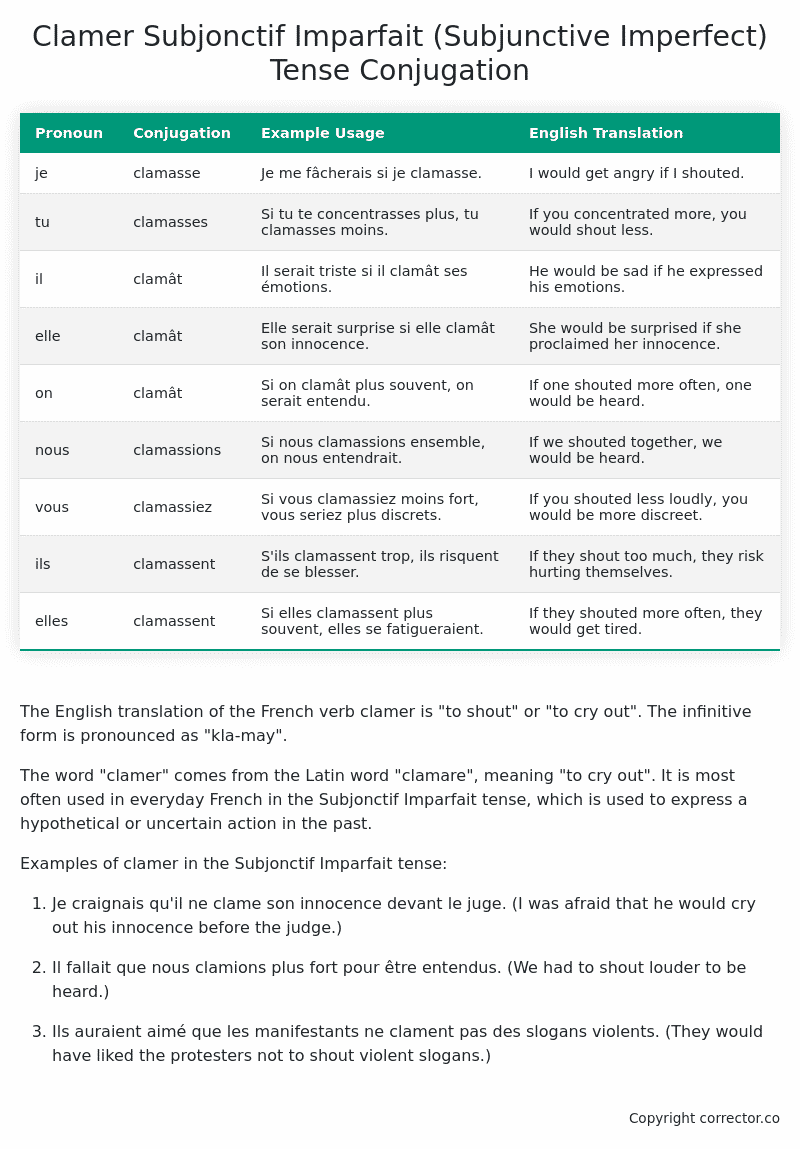Subjonctif Imparfait (Subjunctive Imperfect) Tense Conjugation of the French Verb clamer
Introduction to the verb clamer
The English translation of the French verb clamer is “to shout” or “to cry out”. The infinitive form is pronounced as “kla-may”.
The word “clamer” comes from the Latin word “clamare”, meaning “to cry out”. It is most often used in everyday French in the Subjonctif Imparfait tense, which is used to express a hypothetical or uncertain action in the past.
Examples of clamer in the Subjonctif Imparfait tense:
-
Je craignais qu’il ne clame son innocence devant le juge. (I was afraid that he would cry out his innocence before the judge.)
-
Il fallait que nous clamions plus fort pour être entendus. (We had to shout louder to be heard.)
-
Ils auraient aimé que les manifestants ne clament pas des slogans violents. (They would have liked the protesters not to shout violent slogans.)
Table of the Subjonctif Imparfait (Subjunctive Imperfect) Tense Conjugation of clamer
| Pronoun | Conjugation | Example Usage | English Translation |
|---|---|---|---|
| je | clamasse | Je me fâcherais si je clamasse. | I would get angry if I shouted. |
| tu | clamasses | Si tu te concentrasses plus, tu clamasses moins. | If you concentrated more, you would shout less. |
| il | clamât | Il serait triste si il clamât ses émotions. | He would be sad if he expressed his emotions. |
| elle | clamât | Elle serait surprise si elle clamât son innocence. | She would be surprised if she proclaimed her innocence. |
| on | clamât | Si on clamât plus souvent, on serait entendu. | If one shouted more often, one would be heard. |
| nous | clamassions | Si nous clamassions ensemble, on nous entendrait. | If we shouted together, we would be heard. |
| vous | clamassiez | Si vous clamassiez moins fort, vous seriez plus discrets. | If you shouted less loudly, you would be more discreet. |
| ils | clamassent | S’ils clamassent trop, ils risquent de se blesser. | If they shout too much, they risk hurting themselves. |
| elles | clamassent | Si elles clamassent plus souvent, elles se fatigueraient. | If they shouted more often, they would get tired. |
Other Conjugations for Clamer.
Le Present (Present Tense) Conjugation of the French Verb clamer
Imparfait (Imperfect) Tense Conjugation of the French Verb clamer
Passé Simple (Simple Past) Tense Conjugation of the French Verb clamer
Passé Composé (Present Perfect) Tense Conjugation of the French Verb clamer
Futur Simple (Simple Future) Tense Conjugation of the French Verb clamer
Futur Proche (Near Future) Tense Conjugation of the French Verb clamer
Plus-que-parfait (Pluperfect) Tense Conjugation of the French Verb clamer
Passé Antérieur (Past Anterior) Tense Conjugation of the French Verb clamer
Futur Antérieur (Future Anterior) Tense Conjugation of the French Verb clamer
Subjonctif Présent (Subjunctive Present) Tense Conjugation of the French Verb clamer
Subjonctif Passé (Subjunctive Past) Tense Conjugation of the French Verb clamer
Subjonctif Imparfait (Subjunctive Imperfect) Tense Conjugation of the French Verb clamer (this article)
Subjonctif Plus-que-parfait (Subjunctive Pluperfect) Tense Conjugation of the French Verb clamer
Conditionnel Présent (Conditional Present) Tense Conjugation of the French Verb clamer
Conditionnel Passé (Conditional Past) Tense Conjugation of the French Verb clamer
L’impératif Présent (Imperative Present) Tense Conjugation of the French Verb clamer
L’infinitif Présent (Infinitive Present) Tense Conjugation of the French Verb clamer
Struggling with French verbs or the language in general? Why not use our free French Grammar Checker – no registration required!
Get a FREE Download Study Sheet of this Conjugation 🔥
Simply right click the image below, click “save image” and get your free reference for the clamer Subjonctif Imparfait tense conjugation!

Clamer – About the French Subjonctif Imparfait (Subjunctive Imperfect) Tense
Formation
Common Everyday Usage Patterns
Interactions with Other Tenses
Subjonctif Présent
Indicatif Passé Composé
Conditional
Conditional Perfect
Summary
I hope you enjoyed this article on the verb clamer. Still in a learning mood? Check out another TOTALLY random French verb conjugation!


